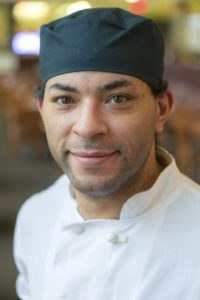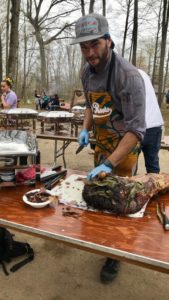Slow Food Leaders: Yusuf Bin-Rella
 Culinary Genealogy
Culinary Genealogy
Chef Yusuf Bin-Rella’s cooking career began with hopes of licking spoons and beaters of frosting. As a child, Yusuf was the only man allowed in the kitchen (due to his quiet nature and ability to finish tasks) and although his cooking curiosity grew from hedonistic impulses, he found that cooking, and the impact cuisine can have on culture, stuck with him. He knew early on that cooking was something he wanted to do when he grew up.
Now, Yusuf is a chef at University of Wisconsin, Madison’s Dejope Residence Hall (Dejope translates to “Four Lakes” in the native Ho-Chunk language) and at TradeRoots Culinary Collective, a group of Afro-culinary genealogists exploring lineage through food that Bin-Rella co-founded with Devon Hamilton and Candy Flowers. Originally developed for a trip to Africa for a documentary with culinary genealogist Michael Twitty, TradeRoots was named after the trade roots of the African diaspora and foodways, challenging us to understand the sources of our cultural cuisines. “Take soul food, for example,” Yusuf says. “You wouldn’t have cornbread without corn — how did that story of corn begin?” TradeRoots now teaches Afro-culinary traditions to youth and students with pop-ups around Madison, including at Badger Rock Community Center.
Food Sovereignty
After cooking at Standing Rock during the Dakota Access Pipeline protests and meeting Brian Yazzie, Yusuf was struck by the importance of food sovereignty and began to partner extensively with Dan Cornelius (Intertribal Agriculture Council and Native Food Network) and formed a collaboration between TradeRoots and Wild Bearies, an Indigenous culinary initiative led by chef Elena Terry. The resulting “Wild Roots” works with different tribes in the food sovereignty movement, teaching members of tribal communities not only how to grow and cook Indigenous ingredients, but also how to incorporate self-grown and harvested foods into their diets. To Yusuf, food sovereignty represents “reconnecting to and celebrating one’s roots and ancestry and not needing to ask permission to feed yourself, your family and your community foods that are culturally appropriate.” Wild Roots emphasizes the importance of youth in the food movement, creating YouTube videos in which children showcase and teach cooking techniques and tell their stories.
One of Yusuf’s favorite recipes is for preserved Gete-Okosomin squash — “a gigantic squash, about the size of a toddler” — that you can roast with nothing else, but tastes just like pumpkin pie. He also partners with the talented Shelley Buffalo, branch coordinator of the Meskwaki Food Sovereignty Initiative, to host native culinary festivals for harvest and planting events throughout the Midwest, fostering community and celebration. Coming up is the Hunter’s Festival, where Yusuf and Elena will demonstrate cooking techniques for wild game: bison, squirrel, beaver, rabbit, muskrat and venison.
“Food sovereignty is reconnecting to and celebrating one’s roots and ancestry and not needing to ask permission to feed yourself, your family and your community foods that are culturally appropriate.”
 The Slow Food in Everyone
The Slow Food in Everyone
Even before Yusuf started cooking, he had a little bit of Slow Food in his blood: he grew up with a victory garden that his grandparents began during World War II. “I hate this phrase, but I’ve always been a farm-to-table person,” he says. “I’ve always looked at growing as a means of resistance against corrupt food systems.” Meeting Indigenous chefs and food warriors intensified his desire to protect his ancestral foods and carry their stories into the future. Yusuf appreciates the unity that Slow Food brings to eaters and the path that Slow Food values: “growing food, taking care of it, watching it grow, elevating our respect for the process and seeing it through to completion, and saving seeds, stories and recipes.”
Yusuf sees the future of Slow Food in home cooks and in women. Home cooks have been practicing Slow Food for a very long time — feeding their families with good, clean and fair food — yet he feels that the majority of people have been disconnected from these foodways. The modern Slow Food movement will be the recognition and embrace of day-to-day people-feeders, the majority of which are women. “Who kept the seeds and recipes alive? Who cooks for the funerals, for the births and the birthdays?” Yusuf asks. “I can assure you the vast majority of birthday cakes ever baked for mankind were baked by women.” Women are the original Slow Foodies; more of their stories need to be told. The challenge Slow Food now faces is reconnecting people with their roots and, in the process, stimulating food sovereignty. Yusuf urges mainstream food communities to embrace their authentic foodways and stop commercializing Slow Food.
An easy place to start on this journey? Yusuf says take a genealogy test, find your ancestral roots and foods. “Who are you really? White doesn’t really exist. What do you break down to?” Yusuf himself has taken many ancestry tests and even found “long lost” relatives living two counties away. He hopes that the average person can take pride in their heirloom recipes and their grandma’s cooking and support local people growing their Indigenous foods. He also asks us to compare food production to a football game: “If you look at the process from seed to harvest to final plating, there are some extreme factors that occur, hardships that farmers and processors and harvesters endure. Just as much or more physical effort goes into food production as a football game.”

 Culinary Genealogy
Culinary Genealogy The Slow Food in Everyone
The Slow Food in Everyone